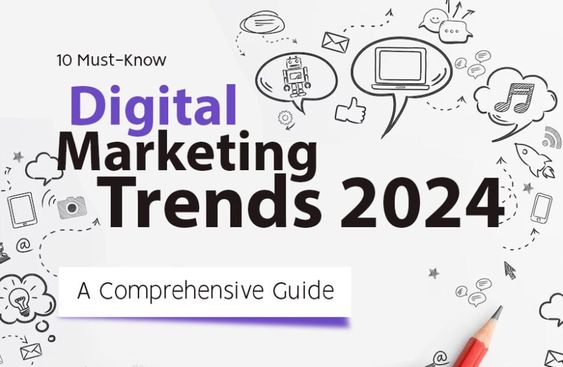Digital marketing is constantly evolving, and 2024 is no different. Here are the latest trends that are shaping the digital marketing landscape this year:
1. AI-Powered Marketing
- AI Tools and Automation: Artificial intelligence continues to revolutionize digital marketing by enabling hyper-personalization at scale. Tools like ChatGPT and AI-driven analytics platforms help marketers create more targeted and effective campaigns by analyzing vast amounts of data, predicting consumer behavior, and optimizing content.
- Content Creation: AI is increasingly used for content generation, from blog posts to social media updates, enabling faster content production while maintaining quality.
2. Voice Search Optimization
- Growing Use of Voice Assistants: With the rising popularity of voice assistants like Alexa, Siri, and Google Assistant, optimizing for voice search is becoming essential. Marketers need to focus on long-tail keywords and conversational language to align with how people naturally speak when using voice search.
- Local SEO: Voice searches are often local in nature (e.g., “find a digital marketing agency near me”), making local SEO more critical than ever. Ensuring your business is optimized for local search results will help capture voice search traffic.
3. Short-Form Video Content
- Dominance of TikTok and Reels: Short-form video platforms like TikTok and Instagram Reels continue to dominate social media, with a focus on engaging, bite-sized content. Brands are leveraging these platforms to reach younger audiences and create viral content.
- Snackable Content: The trend towards “snackable” content—short, engaging videos that can be consumed quickly—means marketers need to be creative and concise to capture attention in just a few seconds.
4. Sustainability and Social Responsibility
- Purpose-Driven Marketing: Consumers are increasingly choosing brands that align with their values, particularly in terms of sustainability and social responsibility. In 2024, companies are expected to emphasize eco-friendly practices, social justice, and community engagement in their marketing efforts.
- Transparency: Consumers demand transparency regarding a company’s sustainability practices. Brands that communicate their efforts effectively are more likely to build trust and loyalty.
5. Interactive Content
- Engagement Through Interaction: Interactive content such as polls, quizzes, and interactive videos is gaining popularity as it boosts engagement by involving the audience directly. This type of content not only entertains but also collects valuable data on consumer preferences.
- Augmented Reality (AR): AR is becoming more accessible, allowing brands to create immersive experiences. For example, AR can enable customers to virtually try products before purchasing, enhancing the online shopping experience.
6. Data Privacy and First-Party Data
- Shift to First-Party Data: With increasing regulations on data privacy and the phasing out of third-party cookies, marketers are focusing more on collecting first-party data (information directly from customers). This data is critical for creating personalized experiences while maintaining consumer trust.
- Compliance: Ensuring compliance with data protection regulations like GDPR and CCPA is crucial. Brands must be transparent about how they collect, store, and use data.
7. Influencer Marketing Evolution
- Micro and Nano Influencers: While influencer marketing remains a powerful tool, there’s a shift towards collaborating with micro and nano influencers who have smaller but highly engaged audiences. These influencers often have stronger relationships with their followers, leading to more authentic and effective campaigns.
- Performance-Based Collaborations: Brands are increasingly focusing on performance-based contracts with influencers, where compensation is tied to specific results like sales or lead generation.
8. Omnichannel Marketing
- Seamless Customer Experience: Omnichannel marketing—creating a cohesive customer experience across various online and offline channels—is becoming a key strategy. Consumers expect consistency in how they interact with brands, whether they’re shopping online, engaging on social media, or visiting a physical store.
- Integrated Marketing Campaigns: Successful omnichannel strategies require integrating data and messaging across channels, ensuring that each touchpoint reinforces the brand’s overall narrative.
9. Personalization at Scale
- Data-Driven Personalization: Consumers expect personalized experiences, and advances in AI and data analytics are enabling brands to deliver this at scale. Personalization can range from tailored product recommendations to individualized content experiences based on user behavior.
- Dynamic Content: Using dynamic content that adapts in real-time to the user’s preferences and actions can significantly enhance engagement and conversion rates.
10. Sustainability and Social Responsibility
- Purpose-Driven Branding: Consumers are more inclined to support brands that demonstrate social and environmental responsibility. In 2024, sustainability will play a critical role in brand loyalty and customer engagement.
These trends highlight the growing importance of technology, data, and consumer-centric strategies in digital marketing. To stay competitive, businesses need to adapt to these changes, ensuring their marketing efforts are innovative, transparent, and aligned with consumer expectations(Domain Stores & Hosting,Atom).
